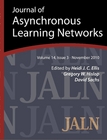Skepticism to Success: Meeting Critical Workforce Needs Through Innovation and Collaboration
DOI:
https://doi.org/10.24059/olj.v14i3.136Keywords:
Blended Learning, eLearning, Higher Education, Workforce EducationAbstract
Health science degrees are in increasing demand at community and technical colleges and have traditionally been challenging to integrate into an asynchronous model. In an effort to meet workforce demand and the needs of working or place-bound students, Whatcom Community College developed an online version of their existing face-to-face Physical Therapist Assistant program in 2006. This program has been successful in meeting a diverse range of needs and interests through innovation, partnerships and use of technology. The program has been recognized nationally by the National Council of Instructional Administrators for Community College Exemplary Initiatives in 2009 and was also recognized statewide with the Washington State 2008 Governor’s Award for Workforce Best Practices. The online Physical Therapist Assistant program has served as a model for the development of other lab-based health science degrees at Whatcom Community College (WCC). Faculty provide leadership to both the WCC campus and community colleges statewide. This article will describe research studies that support the program’s practices and will include the story of how the program successfully developed despite faculty and professional community skepticism.Published
2010-11-20
Issue
Section
Innovations in Online and Blended Education in Community Colleges
License
As a condition of publication, the author agrees to apply the Creative Commons – Attribution International 4.0 (CC-BY) License to OLJ articles. See: https://creativecommons.org/licenses/by/4.0/.
This licence allows anyone to reproduce OLJ articles at no cost and without further permission as long as they attribute the author and the journal. This permission includes printing, sharing and other forms of distribution.
Author(s) hold copyright in their work, and retain publishing rights without restrictions






